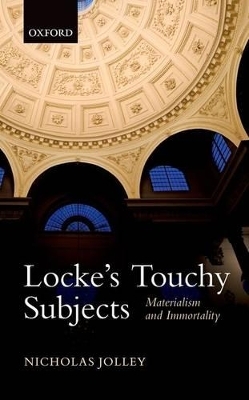
Locke's Touchy Subjects
Materialism and Immortality
Seiten
2015
Oxford University Press (Verlag)
978-0-19-873709-4 (ISBN)
Oxford University Press (Verlag)
978-0-19-873709-4 (ISBN)
Nicholas Jolley shows that the mind-body problem and the nature of personal immortality are more central to Locke's philosophy than has been realized. He argues that Locke takes up unorthodox positions in both cases, and holds that Locke's criticisms of Descartes were controversial responses to challenging metaphysical and theological issues.
In seventeenth-century philosophy the mind-body problem and the nature of personal immortality were two of the most controversial and sensitive issues. Nicholas Jolley seeks to show that these issues are more prominent in Locke's philosophy than has been realized. He argues further that Locke takes up unorthodox positions in both cases. Although Locke's official stance on the mind-body problem is agnostic, in places he presents arguments that, taken together, amount to a significant case for a weak form of materialism. Locke also seeks to show that the solution to the mind-body problem is irrelevant to the issue of personal immortality: for Locke, such immortality is conceptually possible even if the same body is not resurrected at the Day of Judgment. Jolley throws new light on such central topics in An Essay Concerning Human Understanding as substance and personal identity: he also pays close attention to such neglected topics as his account of the status of animals and his polemic against the thesis that the mind always thinks. Throughout, the book examines Locke's arguments against the background of Descartes' views. Jolley argues that Locke's criticisms of Descartes are no mere defences of common sense against dogmatism; rather, they are controversial responses to some of the most challenging metaphysical and theological issues of his time.
In seventeenth-century philosophy the mind-body problem and the nature of personal immortality were two of the most controversial and sensitive issues. Nicholas Jolley seeks to show that these issues are more prominent in Locke's philosophy than has been realized. He argues further that Locke takes up unorthodox positions in both cases. Although Locke's official stance on the mind-body problem is agnostic, in places he presents arguments that, taken together, amount to a significant case for a weak form of materialism. Locke also seeks to show that the solution to the mind-body problem is irrelevant to the issue of personal immortality: for Locke, such immortality is conceptually possible even if the same body is not resurrected at the Day of Judgment. Jolley throws new light on such central topics in An Essay Concerning Human Understanding as substance and personal identity: he also pays close attention to such neglected topics as his account of the status of animals and his polemic against the thesis that the mind always thinks. Throughout, the book examines Locke's arguments against the background of Descartes' views. Jolley argues that Locke's criticisms of Descartes are no mere defences of common sense against dogmatism; rather, they are controversial responses to some of the most challenging metaphysical and theological issues of his time.
Nicholas Jolley was educated at King's School, Canterbury, and Clare College, Cambridge where he was both an undergraduate and a research student. He was a Research Fellow at Christ's College, Cambridge from 1974 to 1978, and has taught at the University of California, San Diego (1978-99), Syracuse University (1999-2000), and the University of California, Irvine (2000-2009), where he was Chair of the Department of Philosophy from 2004 to 2007.
Acknowledgements ; Abbreviations ; 1. Introduction ; 2. Dull Souls ; 3. Animals ; 4. Substance ; 5. Thinking Matter ; 6. An Eternal Thinking Being ; 7. Personal Identity and Resurrection ; 8. Mortalism and Immortality ; Bibliography ; Index
| Erscheint lt. Verlag | 21.5.2015 |
|---|---|
| Verlagsort | Oxford |
| Sprache | englisch |
| Maße | 142 x 219 mm |
| Gewicht | 324 g |
| Themenwelt | Geschichte ► Teilgebiete der Geschichte ► Religionsgeschichte |
| Geisteswissenschaften ► Philosophie ► Philosophie des Mittelalters | |
| Geisteswissenschaften ► Philosophie ► Philosophie der Neuzeit | |
| Geisteswissenschaften ► Religion / Theologie | |
| Sozialwissenschaften | |
| ISBN-10 | 0-19-873709-2 / 0198737092 |
| ISBN-13 | 978-0-19-873709-4 / 9780198737094 |
| Zustand | Neuware |
| Haben Sie eine Frage zum Produkt? |
Mehr entdecken
aus dem Bereich
aus dem Bereich
Herkunft, Blüte, Weg nach Osten
Buch | Hardcover (2024)
C.H.Beck (Verlag)
CHF 55,90
Von den Anfängen bis zur Gegenwart
Buch | Hardcover (2022)
C.H.Beck (Verlag)
CHF 47,60
warum die Religionen erst im Mittelalter entstanden sind
Buch | Hardcover (2024)
C.H.Beck (Verlag)
CHF 53,20


